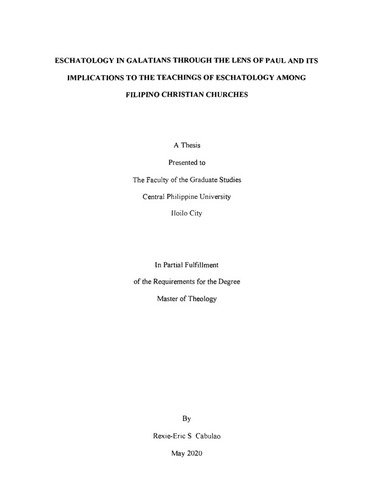Eschatology in Galatians through the lens of Paul and its implications to the teachings of eschatology among Filipino Christian churches
| dc.contributor.adviser | Pagara, Bernabe C. | |
| dc.contributor.author | Cabulao, Rexie-Eric S. | |
| dc.date.accessioned | 2021-09-02T08:00:17Z | |
| dc.date.available | 2021-09-02T08:00:17Z | |
| dc.date.issued | 2020 | |
| dc.identifier.citation | Cabulao, R. E. S. (2020). Eschatology in Galatians through the lens of Paul and its implications to the teachings of eschatology among Filipino Christian churches (Unpublished Master’s thesis). Central Philippine University, Jaro, Iloilo City. | en_US |
| dc.identifier.uri | https://hdl.handle.net/20.500.12852/1359 | |
| dc.description | Abstract only | en_US |
| dc.description.abstract | The study aimed to analyze eschatology in Galatians through the lens of Paul and its implications to the understanding of eschatology among Filipino Christian Churches in Mindanao. The design used was descriptive in content that highlighted the historical narrative of Paul in selected passages of Galatians. Specifically, the study aimed to: discuss the sociocultural, education and religious background of Paul and how this shaped his understanding of eschatology; discuss his understanding of eschatology in Galatians through exegesis; examine Filipino Christian Churches' teachings on eschatology; and draw out implications of Paul’s theology of eschatology in Galatians to the teachings of Eschatology among Filipino Christian churches. Paul’s life, socio-political millieu, education, religion, ministry, worldview, experiences, and declaration of the gospel were traced through the culture of his day. All six selected Christian churches believe that Jesus would surely return to be with them in paradise forever. Endurance and loyalty to His teachings would encourage them to carry and fulfill their missions faithfully. A major difference in their belief on eschatology is the time of Christ’s return. However, Paul understood end times as the beginning of the new era which refers to the renewal of God's creation from the fall. The presence of Christ made the Church complete and restored from the deterioration of the corrupt system of this world. For Paul, God will set everything right, restoring and renewing creation, and this future must fulfill the promises made to Israel in particular. This study concluded that the Christian churches’ understanding of eschatology affects their lifestyle, as evident in the way they treat others and their response to the Great Commission. Indeed, it is not healthy for the Christian Churches to engage in schism, instead, they have to agree on major doctrines of the faith but allow minor differences, for instance, on the issue of eschatology. | en_US |
| dc.format.extent | viii, 103 leaves | en_US |
| dc.language.iso | en | en_US |
| dc.subject.ddc | TheoLib Theses 207.2 C112 | en_US |
| dc.subject.lcsh | Eschatology | en_US |
| dc.subject.lcsh | Eschatology--Biblical teaching | en_US |
| dc.subject.lcsh | Bible. Galatians | en_US |
| dc.subject.lcsh | Bible. Galatians--Commentaries | en_US |
| dc.subject.lcsh | Paul, the Apostle, Saint | en_US |
| dc.subject.lcsh | Protestant churches | en_US |
| dc.subject.lcsh | Eschatology--Study and teaching | en_US |
| dc.title | Eschatology in Galatians through the lens of Paul and its implications to the teachings of eschatology among Filipino Christian churches | en_US |
| dc.type | Thesis | en_US |
| dc.description.bibliographicalreferences | Includes bibliographical references | en_US |
| dc.contributor.chair | Libo-on, Rowena M. | |
| dc.contributor.committeemember | Villeza, Rea Angelica F. | |
| dc.contributor.committeemember | Narciso, Jerson B. | |
| dc.contributor.department | School of Graduate Studies | en_US |
| dc.description.degree | Master of Theology | en_US |
| local.subject | Filipino Christian churches | en_US |


